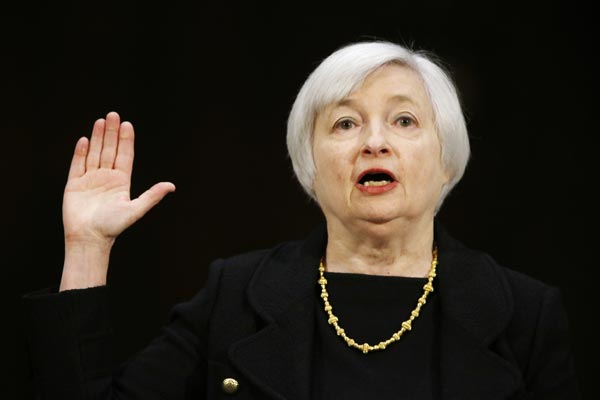|
 Janet Yellen, President Barack Obama's nominee to lead the US Federal Reserve, is sworn in to testify at her US Senate Banking Committee confirmation hearing in Washington in this November 14, 2013, file photo. [Photo/Agencies] |
WASHINGTON - Janet Yellen, a key force behind the Federal Reserve's unprecedented and controversial efforts to boost the U.S. economy, was confirmed by the Senate on Monday to lead the central bank just as it begins to unwind that stimulus.
When she succeeds Ben Bernanke, whose second four-year term as Fed chairman expires on January 31, Yellen will become the first woman to run the Fed in its 100-year history and just one of a handful of women heading central banks globally. She is currently the Fed's vice chair.
The vote to approve her was 56-26. Yellen won resounding support from Democrats, but many Republicans voted no.
The Fed cut overnight interest rates to near zero in late 2008 and has quadrupled its balance sheet to more than $4 trillion through a series of massive bond purchase programs meant to push down longer-term borrowing costs.
Yellen, 67, spent years defending those efforts, arguing both as Bernanke's deputy and before that as head of the San Francisco Federal Reserve Bank that they would reduce borrowing costs and spur hiring and economic growth.
Now those policies appear to be working: the U.S. unemployment rate fell in November to a five-year low of 7 percent and the economy grew in the third quarter of 2013 at its fastest pace in almost two years.
Yellen's main task in the world's most powerful financial post likely will be to navigate the central bank's way out of its extraordinary stimulus, beginning with dialing down its bond-buying program.
In December, Bernanke began the process, leading the central bank to its landmark decision to shave the bond purchases to $75 billion this month from a previous monthly pace of $85 billion.
The entire program, known as QE3 because it is the Fed's third such effort at so-called quantitative easing, will likely be shuttered by late 2014 so long as the economic recovery proceeds as forecast, Bernanke said.
Many Republicans and several of Yellen's own Fed colleagues see the wind-down of that program as long overdue and warn that the buildup of bonds on the Fed's balance sheet could stoke inflation or asset-price bubbles.
"This expansionary monetary policy cannot continue into perpetuity without causing real and lasting damage to our economy," said Senator Charles Grassley, an Iowa Republican.
Those concerns notwithstanding, analysts by and large expect Yellen to stick with the "dovish" approach to policy that she has long been known for, with a focus on reducing unemployment, particularly if inflation continues to run well below the Fed's 2 percent target.
Yellen has long argued that the Fed should tolerate slightly higher inflation if that is the cost of fighting high unemployment. But she has also advocated interest rate increases when she felt the threat of inflation called for them.
"She is a strong person but she is also one who is open to other people's opinion and learns quickly," said Bill Rhodes, president of William R. Rhodes Global Advisors and a former senior vice chairman at Citigroup. "I think there has been a tendency to underrate her ability, frankly."
Yellen is the first person appointed to an initial term as Fed chair by a Democratic president since Jimmy Carter named Paul Volcker to head the U.S. central bank in 1979. Although both Bernanke and his predecessor Alan Greenspan were reappointed by Democrats, their initial nominations were made by Republicans -- George W. Bush and Ronald Reagan, respectively.
And with Obama already one year into his second and last term as president, Yellen's appointment means his influence on economic policy will extend beyond his presidency.
|
|
|
|
|
|
|
|
